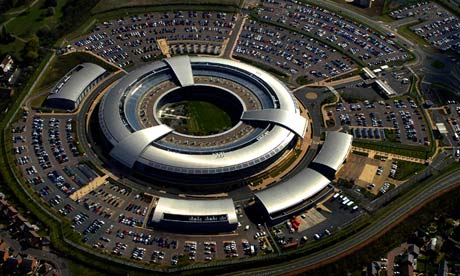The British and US spy programmes that allow intelligence agencies to gather, store and share data on millions of people have been challenged in a legal claim brought by privacy campaigners.
Papers filed on Monday call for an immediate suspension of Britain's use of material from the Prism programme, which is run by America's National Security Agency.
They also demand a temporary injunction to the Tempora programme, which allows Britain's spy centre GCHQ to harvest millions of emails, phone calls and Skype conversations from the undersea cables that carry internet traffic in and out of the country.
Lawyers acting for the UK charity Privacy International say the programme is not necessary or proportionate. They say the laws being used to justify mass data trawling are being abused by intelligence officials and ministers, and need to be urgently reviewed.
Privacy International has submitted a claim to the Investigatory Powers Tribunal (IPT), which is supposed to review all complaints about the conduct of Britain's spy agencies. The organisation hopes for a public hearing and early rulings because of the seriousness of the situation.
The group was prompted into legal action by the US whistleblower Edward Snowden and the leak of top secret papers he gave to the Guardian. This led to a series of stories about the extent of modern-day surveillance and the disclosure of activities that have provoked a worldwide debate about the behaviour of western intelligence agencies.
In a 22-page statement of grounds, Privacy International refers to the Prism programme, which allows the NSA to intercept the communications of non-US citizens living outside America from global internet companies such as Google, Facebook and Yahoo.
The Guardian revealed that some of this information has been shared with GCHQ. So far the government has refused to say under what legal authority this has been done – if GCHQ had wanted to get this material for itself in the UK, it would have to apply under the Regulatory of Investigatory Powers act (Ripa) for a warrant from a minister.
Campaigners fear Britain is circumventing its own rules to make it easier to get intelligence, and that the emails and calls of Britons are almost certainly being swept up by the NSA.
"The contents of an individual's phone calls and emails and the websites they visit can be information of a obviously private nature," the claim says.
"If UK authorities are to be permitted to access such information in relation to those located in the UK in secret and without their knowledge or consent, the European convention on human rights (ECHR) requires there to be a legal regime in place which contains sufficient safeguards against abuse of power and arbitrary use. There is no such regime."
In modern communications, emails and phone calls made in the UK pass electronically through the US and can be intercepted by the NSA.
"Through their access to the US programme, UK authorities are able to obtain private information about UK citizens without having to comply with any requirements of Ripa," the claim argues.
The second ground focuses on Tempora, a system that stores for up to 30 days vast quantities of data drawn from undersea internet cables.
The Guardian revealed this programme is part of an over-arching project at GCHQ called "Mastering the Internet". The data is shared with NSA and by last year 550 analysts from both countries were filtering through the contents.
Privacy International argues this amounts to "blanket surveillance".
"Such surveillance cannot be justified as a proportionate response to a legitimate aim. Bulk interception of communications and bulk inspection of such data is disproportionate interference with the rights guaranteed by article 8 of the ECHR, and it is not being undertaken pursuant to a legal regime containing sufficient safeguards to render it in accordance with the law."
The claim says Ripa "does not provide sufficiently specific or clear authorisation for such wide-ranging and universal interception of communications, nor any sufficient or proper safeguards against misuse that are known and available to the public".
Carly Nyst, the head of international advocacy at Privacy International, said the group had wanted to bring the legal challenge through a normal court so the arguments could be heard in public.
But the UK government had insisted the group go through the IPT, which has only ever upheld 10 complaints against any of the agencies from more than 1,000 cases.
"We have been forced to take our concerns to a secret tribunal, the IPT," she said. "It shouldn't be a surprise. Why would the government want their dirty laundry aired in public when it can be handled by a quasi-judicial body that meets and deliberates in secret, the decisions of which are neither public nor appealable to any higher authority?"
She added: "In one of the world's most respected and stable democracies, there exists a system of 'oversight' that would be at home in any authoritarian regime. A public debate about the covert activities of British intelligence services is drastically needed and long overdue."
Eric King, head of research at Privacy International, added: "One of the underlying tenets of law in a democratic society is the accessibility and foreseeability of a law. If there is no way for citizens to know of the existence, interpretation, or execution of a law, then the law is effectively secret. And secret law is not law. It is a fundamental breach of the social contract if the government can operate with unrestrained power in such an arbitrary fashion."
The civil rights group Liberty has also made a complaint to the IPT. It believes that its own electronic communications and those of its staff may have been unlawfully intercepted by the security services and GCHQ.











